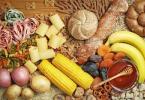What are proteins?
Proteins are high-molecular organic compounds of alpha-amino acids. In order for proteins to digest in the body, they need to be broken down into amino acids, which occurs with the help of various enzymes throughout the passage of the protein through the gastrointestinal tract. This process is long and energy consuming. In the process of assimilation of fats and carbohydrates, the body spends about 5 - 7% of the energy contained in them, and in the process of assimilating protein - 30 - 40%. Often, the energy contained in proteins is only enough to perform the basic plastic functions of the body. And therefore for the assimilation of proteins, the energy of fats and carbohydrates is used. And if they are not enough in the consumed food, then begin to spend fat reserves.
The diet should contain the necessary amount of protein, it helps to improve the basal metabolic rate and does not allow muscle mass to decrease. As a result of the lack of protein in food, the body is forced to use muscle protein. Very often, with improper weight loss (wrong diet), a person loses body weight not only due to fat, but also muscle mass. And then, when he begins to gain weight, most often this is due to an increase in body fat and the percentage of fat content increases. An increase in fat mass and a decrease in muscle mass leads to a slowdown in metabolism, therefore, it is rather difficult to keep the results achieved by puffing.
What is dangerous protein deficiency?
Proteins take part in almost all vital processes of the body. With a lack of protein in children, growth and development slows down, in adults, the work of the liver, endocrine glands, and heart deteriorates, hormones, memory, and work capacity deteriorate.
Protein deficiency reduces immunity, often accompanied by avitaminosis, a violation of the absorption of many nutrients and trace elements. As a result, serious hormonal disorders can develop.
Exercise destroys muscle cells, which can only be restored with protein. The benefits of exercise is manifested only with sufficient protein intake.
Excess protein
If the excess of the required amount of protein in the diet is insignificant, then this will not lead to undesirable consequences. The problems associated with excessive consumption of protein are quite rare, as in our diet it is rather a shortage, but they happen. Proteins do not accumulate in the body, their excess is converted into glucose, as well as nitrogenous compounds that are excreted from the body. Excess protein increases the acid reaction of the body, and this leads to loss of calcium.
Protein uptake
In different foods, the percentage of protein digestion varies. For example, egg white and protein in milk are absorbed by 100%, in beef - by 92%, peas - by 69%, beans - 68%, in oats - by 57%, lentils and peanuts - by 52%, in wheat - by 40 % True, it should be remembered that protein-rich milk, eggs and meat contain a lot of fat. Emphasis should be placed on low-fat cottage cheese and yogurt, low-fat cheese, white meat, veal, soy meat, milk and cheese. Less preferred are dark poultry, red meat, cottage cheese, bacon, salami, ham, and yoghurt with sugar.
Proteins are better absorbed after heat treatment.
You need to lose weight correctly
If you decide to lose weight, while changing your diet, remember:
- Lack of complete protein leads to reduced immunity, hormonal disorders, etc.
- In vegetable and fruit diets, as a rule, not enough protein.
- In low-calorie diets, it is necessary to control the amount of protein consumed in order to prevent a decrease in metabolic processes.
- The protein is long absorbed and lengthens the process of assimilation of carbohydrates, in connection with this decreases the overall glycemic index, which allows longer than to experience hunger.
- High protein foods require more digestion.
- Protein is the only supplier of nitrogen in our body. Insufficient production of nitric oxide can lead to disruption of human organs and systems.
- In order for weight loss to occur due to the burning of fat, not muscle mass, it is very important to consume enough protein.
- Physical activity can harm the body with insufficient protein intake!
- Protein consumption requires more water to digest than other food components. Therefore, in order to prevent
Proteins are the most important battery for humans. If we do not get proteins, we become weaker and sick.
Today, most people who eat normally and are not sitting on any diet receive adequate amounts of protein. But among the active slimming situation is somewhat different. Since many of those who are striving to lose weight with all their might, begin to unreasonably limit themselves to protein foods. Which is completely wrong.
Below are 4 justifications for why a healthy diet for sustainable weight loss at home must necessarily be partly protein.
Protein is well saturated
Protein food perfectly satisfies hunger and prevents its occurrence. Even with a small amount of protein intake, the person feels full. This is due at once with several features of protein foods:
- proteins inhibit the production of hunger hormone ghrelin
- promote the production of saturation hormone - peptide YY
The extent to which this feature of proteins is important for the process of losing weight can be understood from a recent study. During the survey it was proved that
an increase in protein intake from 15% to 30% of the daily diet allows women who are overweight to eat less calories 441 per day without forcibly restricting themselves to food.
This is what concerns the present desire, that is, a state where a person is weakening and needs support from nutrients. Separately, it must be said about the painful desire for snacks, both during the day and at night.
This aspiration differs from true hunger in that it has nothing to do with the need to introduce nutrients into the body. In this case, we are talking only about the psychological desire to eat, which in its essence is no different from the desire to smoke or take alcohol.
So, it has been established that the inclusion of an additional amount of proteins in the diet makes it possible to significantly reduce the craving for unmotivated meals.
For example, in one experiment, overweight men after they increased the protein daily by 25%, demonstrated a 60% reduction in cravings for snacks during the day and a 50% reduction at night.
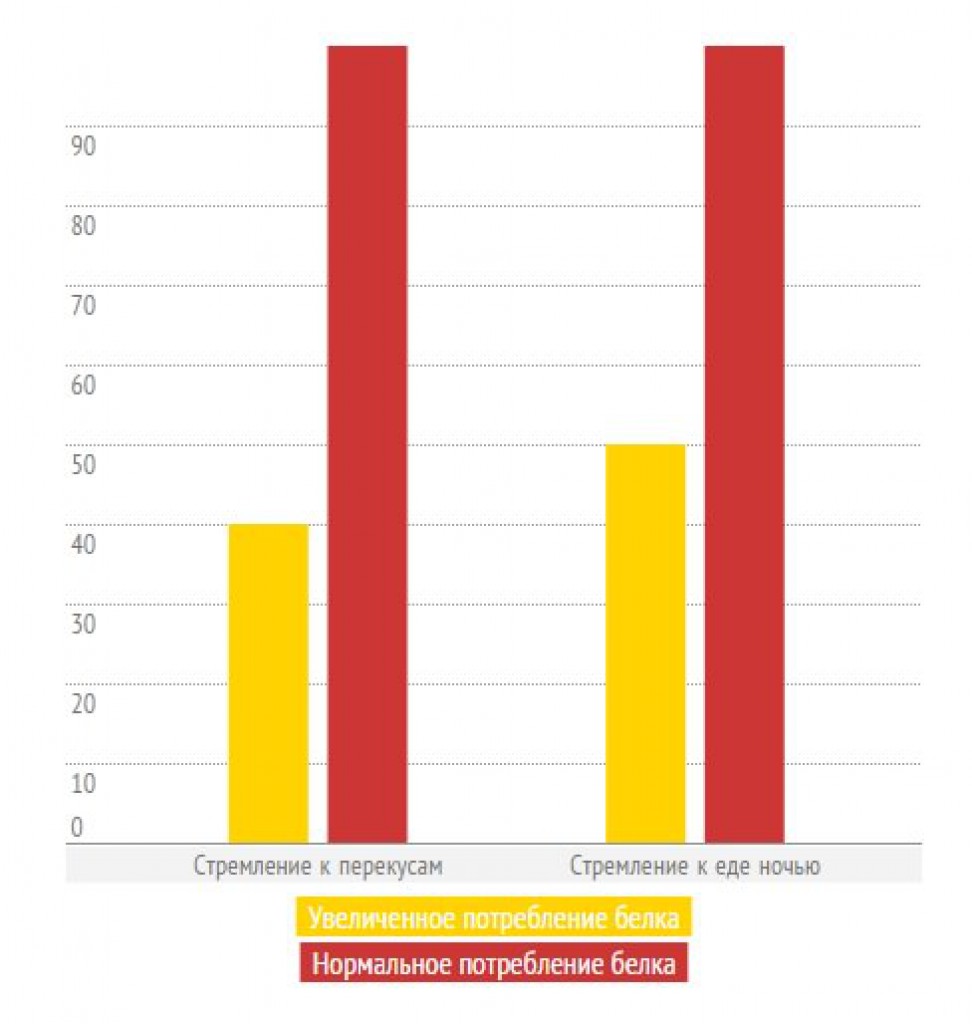
It is believed that this influence of proteins is associated with their ability to normalize the work of dopamine, a neurotransmitter of the brain involved in the formation of various dependencies.
Proteins build muscle
Muscle is a protein formation, and therefore it is obvious that without significant intake of proteins in the body it is impossible to build muscle.
In this case, the need to increase muscle mass is not only in front of young people who want to pump their biceps, but also in front of all those who are on a diet to lose weight.
Very often, getting rid of excess weight is fraught with loss of not unnecessary muscles. To prevent this from happening, any diet must necessarily ensure that the protein component enters the body.
Especially it should be said about the benefits of protein to maintain muscles in good working condition in the elderly. With age, sarcopenia begins - the process of reducing muscle mass. Sarcopenia is inevitable, but it can be significantly slowed down, providing the body with an additional amount of proteins.
Again, this is especially important for people who are losing weight, in which the process of losing muscles goes leaps and bounds, since the side effect of losing excess weight is added to the natural age-related changes.
Proteins increase metabolic rate and accelerate fat burning
This feature of proteins is related to the fact that they possess high thermal effect. That is, their assimilation requires the use of large amounts of energy. Protein food provides the body with the molecules it needs, however, the excess “provisions” are practically not able to be deposited in the form of fat, because they simply burn in the process of digestion.
It is established that a diet with a large amount of protein makes it possible to burn 260 calories more per day than a low protein diet. The same amount of calories burns during an hour of intense training.
Proteins improve bone density
There is a popular belief that protein nutrition, especially of animal origin, leads to an increase in bone fragility.
This is due, they say, to the fact that proteins are "acidic products" that lower the pH of the blood. And to normalize the pH, calcium leaves the bones, which leads to their increased fragility.
It is important to say that this whole theory, just like the alkaline diet itself, does not have any scientific evidence, because the pH of the blood is constant. If he really shifts to the acidic side, the person simply dies (more about this you can read).
But there is a mass of epidemiological data, according to which, protein intake is necessary to retain calcium in bones. It has been established that people whose diet includes the normal amount of protein, including animal, have stronger bones than those who try not to eat proteins.
This difference is particularly noticeable in older people, especially in women during and after menopause, who constitute the main risk group for osteoporosis.
Why is it important to remember losing weight?
Firstly, because women of pre- and menopausal age often need weight loss.
Secondly, because even young people, exhausted by strict diets, can experience accelerated calcium loss.
How much protein is needed per day?
According to common nutritional recommendations:
- the average man (average height, average weight), leading a sedentary lifestyle, must consume at least 56 grams of protein per day (preferably 91 grams)
- average woman - 46-75 grams
It is obvious that the selection of this incomprehensible average person is not quite correct. And the need for proteins depends on very many indicators. So the large role is not played by the body weight itself, but by the percentage of muscles in this mass.
So for people who play sports, do physical work or just walk a lot, protein intake should be more. In this case, the calculation is based on body weight: 1.2-1.4 grams of protein per kilogram of human weight.
Older people also need more protein than middle-aged people: 1.0-1.4 grams per kilogram of body weight.
Making all these calculations, it is important to understand the following.
Grams of protein does not mean the mass of food at all. Namely, the mass of the pure food element - protein, the weight of which will be significantly less than the weight of the food itself.
That is, if you ate 100 grams of beef, you ate no more than 27 grams of protein, or even less.
Therefore, it is very important to know not only what foods contain protein, but how many are there?
List of protein products for weight loss
So let's find out what foods are protein foods.
RELATED MATERIALS
Protein is necessary for good health - this axiom does not need proof, but how much is it needed for losing weight? There are diets where the use of protein products is nearing zero, there are those where everything is built solely on easily digestible proteins. Modern dietetics has no definite answer to this question, but it is certainly necessary to know some principles and facts. The “right” protein is able to facilitate the process of losing weight, both in quantitative and qualitative sense - a well-fed diet makes weight loss much more comfortable and natural.
Protein and weight loss: a biological mechanism
Our body, if we present it in the most simplified form, is built of water and protein compounds. Therefore, both components need to be replenished regularly, and if our body is “disassembled” in a natural way with water, then it is more difficult with proteins. Their main function is to "feed" muscle mass and the construction (regeneration) of new cells in all body systems. At the same time, protein food is not able to turn into body fat, as it happens with carbohydrates. “Protein satiety” is very comfortable and lasts a relatively long time, usually without feeling hungry until the next planned meal. But the lack of protein can lead to a variety of eating disorders. The most common of which is a strong craving for fast carbohydrates, primarily for sweets.
Recently, scientists have proved the relationship between the use of protein products and the state of the skin in the process of losing weight. With a lack of protein and a long diet (more than three weeks), her condition is markedly worsening, and the lower tone of the skin is visible. This fact should be a weighty warning against dragging too radical "protein-free" diets. Another important fact: in chronic stress and disease, protein intake should increase by 20-25%. Therefore, if your way of losing weight is associated with fitness and starvation, the body needs additional “nourishment” during intensive exercise.
How does protein break down
The calculation of the need for protein compounds is described in the literature many times, but, unfortunately, it is not always intelligible. Let's try to fill this gap: the average protein norm in dietology is recommended within 30-35 grams. But this figure itself is not a constant and serves only as a guideline for calculations. Growth characteristics, metabolism, age, initial state of health are all important factors for individual amendments to the norm. Another key aspect is that the protein used in food, is absorbed far from fully, which further complicates the calculations. The difference in splitting can reach up to 80%, if we compare, for example, ocean fish and chicken eggs. Therefore, in sports, especially in bodybuilding, for full "protein control" it is customary to use purified protein, which is easy to calculate.
It is important to understand that the benefits of protein foods when “overdose” turns into serious harm to the body. The degradation products of protein (amino acids) are difficult to digest and often lead to flatulence. This is at best, at worst - sulfur and ammonia from protein disrupt digestion, manifest as skin rashes and allergic reactions.
Proper protein uptake requires some knowledge of the physiology of nutrition. In particular, protein products for better cleavage are recommended to eat without side dishes and additives. In extreme cases, you can combine them with vegetables, where there is a minimum of starch, and do not add fats in the cooking process. Vegetable protein, which is so popular in many diets, is absorbed very poorly. Therefore, it must be supplemented with other products to get the necessary amino acids. For example, legumes should be combined with seafood or lean fish.
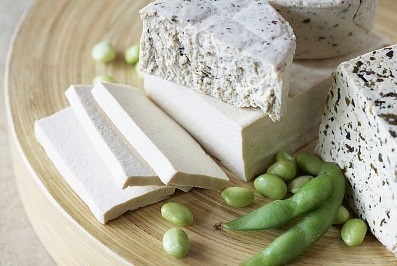
Let's try to describe the approximate diet of protein slimming for better visibility. In the morning, you should consume carbohydrates (you can not refuse them completely, unless on fasting days). Milk porridges, which have been soaked overnight, have proven themselves to be good breakfast. During the day, snacks can be not only protein, but at dinner try to eat only protein. This will allow you to change the metabolism, which led to excess weight, in its own way “reconfigure” the body in a new healthy way. At the same time, it is important to remember that before a protein dinner, it is absolutely impossible to eat carbohydrate meals, at least in two hours. Do not forget about the properties of a specific type of protein foods, because fish or chicken breast can be eaten in the evening, but red meat is better early in order not to spend a sleepless night.
The correct calculation of the protein norm
The calculation should take into account the physical shape, load and intensity of the diet, but first of all - the physique. It is not difficult to calculate your “golden weight”: the Brokka system is best suited for this. From height within 160 centimeters you need to subtract 100 and compare the resulting number with the weight - if they are the same, it means that the weights characteristics are within the normal range. From height from 160 to 170 should be subtracted 105, and above 170 - 110 centimeters.
Naturally, this index is very approximate, since it does not take into account the real physique. To determine its type, the OZ value should be measured (wrist coverage in centimeters). If it is less than 16 for a man and 15 for a woman, then the bone is thin. Up to 20 in a man and 17 in a woman - medium, 21-18 centimeters - wide. From this value, the brocc system should be amended. With "fine bone", 10% of the height-weight index is subtracted, and with wide bone, the same 10% should be added. For example, a woman with a height of 165 centimeters and a wrist coverage of 14 centimeters has an ideal weight of about 54 kilograms. A man has 185-22 centimeters of normal body weight of about 84.5-85 kilograms.
Determining the amount of protein consumed with food occurs according to the standards recommended by the World Health Organization, which constitute at least one gram per “perfect” kilogram, without engaging in heavy physical labor and / or an intense sport. For those engaged in fitness should be considered at the rate of 1.3-1.5 grams, for athletes with a training regime more than four times a week, one and a half to two grams per kilogram of body weight.
Notes and Cautions
Diets based on hyper-consumption of protein foods (for example, the Kremlin) can lead to health problems. American nutritionists have noted an increase in the risk of myocardial infarction, the development of gout, the formation of kidney stones, problems with blood vessels. The lack of protein foods leads to a depressed state of mind, fatigue and unhealthy state of the skin. The balance in protein slimming is difficult to overestimate, so do not neglect the calculations, control the diet and weight loss will be quite easy and enjoyable.
Protein products are so different that sometimes not very compatible things are combined under one term. For weight loss and dietary food, it is better to use "light proteins" from white chicken meat, milk and dairy products, fish and eggs (not only chicken, you can use quail). Seafood diets are also gaining popularity; they really contain high-quality protein, but along with it, microelements with bioactive substances that can be easily overdoshed go along with it. Before applying a deliberately high-protein diet, be sure to consult a nutritionist, as the health risks are very serious.
Human life is impossible without a constant supply of nutrients. To complete the work, our body needs proteins, fats and carbohydrates. Protein is especially important for us, which is also a nourishing, building material for the organism, without it our existence is impossible at all.
Proteins, which are part of the tissues, organs and even bones, also produce enzymes, and they, in turn, "run" all the processes in the body. Including the process of burning fat.
Why does a man have protein?
Lack of protein is bad for health and appearance. Girls who, in pursuit of harmony, starve and deprive themselves of protein, are threatened with frequent colds, poor skin, falling hair and flaccid muscles.
However, this does not mean that you need to eat a pound of meat and ten eggs each day. Excessive protein intake is just as harmful as its deficiency. Excess protein damages the health of the kidneys and liver, which leads to poisoning of the body by decomposition products. So remember - everything is good in moderation.
Sources of protein
By origin proteins are divided into animal and vegetable. Almost all animal products eaten are rich in protein - meat of all kinds, chicken and other poultry, fish, seafood, eggs, milk, cheese, cottage cheese. Among the plant foods high in protein can boast legumes, cereals and nuts.
How much to hang in grams?
Determining the approximate rate of protein is not so difficult - it is equal to your weight, that is, for a woman who weighs 60 kg is 60 g of protein per day. During pregnancy and lactation, with increased physical and emotional stress, recovery after illness, etc. more protein is needed - up to 1.5-2 g per 1 kg of weight.
For example, I can say that 1 boiled egg gives us about 5 g of protein, the same amount we get with a glass of milk or a fermented milk product, a couple of pieces of cheese - about 10 g of protein. In 100 g of lean meat protein about 18-20 g, in 100 g of cottage cheese - 16-18.
At the same time, official medicine believes that more than half of the proteins must be of animal origin. Vegetarians will argue with this, but the fact is that protein from animal food is much better absorbed than from vegetable. And red meat is a traditional source of iron, essential for women. Vegetable protein - cereals and nuts are also very helpful.
If you are not a vegetarian, combine different types of protein foods so that the body gets all the substances it needs.
How to eat protein?
To get the protein norm, it is not enough to just eat it, it is important to do it correctly. All the amount of protein you need to get per day is recommended to be divided into portions, at a time - from 10 to 30 g of protein (it is believed that the “ceiling” is 40 g at a time, but for a woman this is hardly feasible).
For example, 10-15 g at breakfast (boiled egg, cereal with milk and a slice of cheese), 5 g for afternoon tea and second breakfast (a glass of yogurt, a handful of nuts), 25 g for lunch (meat, chicken or fish plus a side dish from buckwheat, rice, etc.), about 15 g for dinner (fish, cottage cheese, cheese).
Protein loves the company of rich in vitamins C, such as lettuce, pepper, cucumbers, tomatoes, greens. It is useful to water the meat or fish with lemon juice.
Protein for losing weight
Proteins + vegetables, so you can briefly describe all existing protein diets. You refuse bread, pasta, sugar and rice and eat only egg whites, chicken breast, fish, cottage cheese and non-starchy vegetables. And you start to lose weight. This is not a very healthy recipe, but as a principle, as a general vector, it is quite possible to use it. Less carbohydrates and fat, more protein and vegetables - in short, the diet of a person losing weight.
If you want to lose weight, the amount of lean protein in the diet should be increased, and the total caloric content reduced by limiting fatty foods, sweets and other "light carbohydrates."
Protein (protein, polypeptide) diets are among the most popular. You can often hear about the benefits of protein foods. But what are the proteins, what is their role and what substances should you use more for losing weight?
After these substances enter the body, it receives a daily rate of amino acids, which accelerate cell regeneration, build muscle mass, make nails and hair stronger, and skin fresh. These substances are important not only for the appearance, but also for the stable operation of all organs and systems.
The norm of protein consumed while losing weight
With their deficiency in the first place losing weight on fruits and vegetables. Weight, of course, on such diets goes very quickly, because the body begins to use its reserves to compensate for the lack of energy.
But such a diet leads to the fact that after some time the muscles lose their tone and the body looks “sagging”.
If you limit the use of proteins, the body will take them from stocks. Since amino acids are the binding material of all elastic tissues, muscles will be the first to suffer. However, this is not at all a reason to oversaturate your diet with proteins, because any substances with excessive use are harmful.
It is recommended to calculate the required amount based on the ratio of 0.5 g of “pure” protein per 1 kg of body weight. If a person goes in for sports or leads a very active lifestyle, then his norm is 2-3 times higher than the received figure.
What are squirrels?
These substances are fast and slow. The first very quickly absorbed by the body, so it is perfect for people involved in sports. Use them before training or immediately after it, because at this time the body needs to be restored.
But protein is not recommended after training for weight loss. That is, a person who is dieting and playing sports should eat 2-3 hours before classes and the same time after them. This measure allows the body to spend more time for fat cells.
Slow body absorbs much longer and at the same time spends more energy, although they are less high-calorie than the first. This type is not suitable for people who want to gain muscle mass, but as an auxiliary product, they are indispensable. However, they are useful proteins for effective weight loss. That they should pay attention to people who want to lose weight.
The most famous representative of the "slow" is cottage cheese. The process of assimilation takes about 6-8 hours.
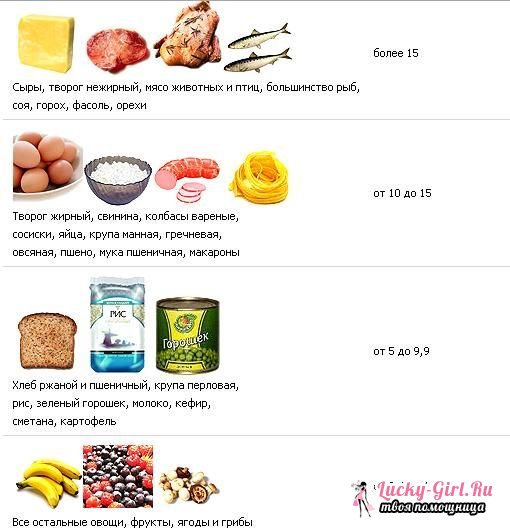
Important role played by the intake of slow proteins. To gain muscle mass, it is recommended to use them at night. While a person is sleeping, the body will calmly digest food, supplying muscles with essential amino acids. In addition, this view is suitable for those who are forced to remain without food for a long time, for example, in the conditions of the working process.
Due to the slow absorption of the product, a person will not feel hunger for a long time, but at the same time the body is supplied with useful substances. In addition, protein for the night is useful for losing weight. It will help burn fat during sleep.
List of foods that can be eaten before going to bed:
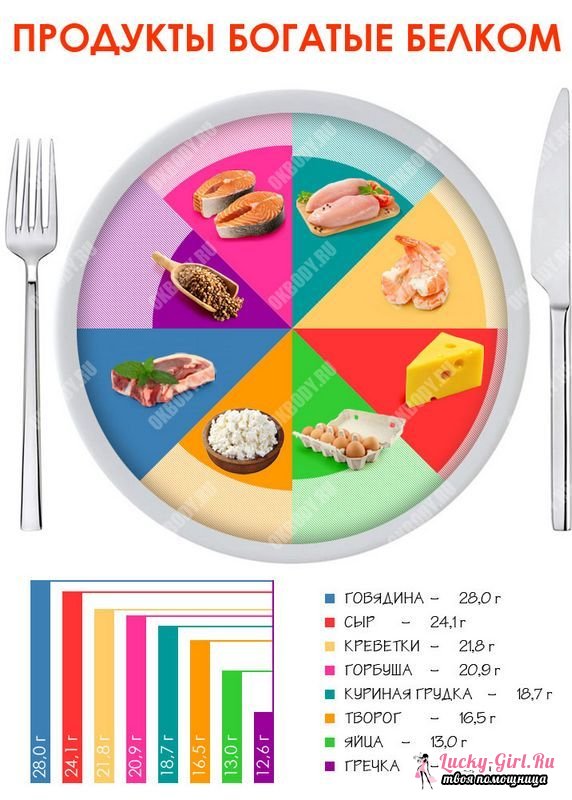
It is worth noting that doctors often recommend eating animal proteins, as they are better absorbed and contain more "pure" proteins. However, allergies can occur when eating a single product. So you need to build a menu so that it is diverse.
Products containing protein and used for weight loss
Immediately it should be noted that not all foods rich in proteins, is useful. The problem is that products containing polypeptides often have a lot of fat. And the latter - the enemy of harmony, besides prevent the body from assimilating the proteins themselves.
The egg white is best perceived and best absorbed. This is due to the fact that the product is low in fat and proteins - fast. But usually it is not recommended to eat more than 2 eggs per day. If a person goes in for sports, then he needs 4 eggs.
No less useful is steamed meat, especially chicken or lean beef. For example, 100 g of fillet contains up to 30 pure proteins. Moreover, such food quickly saturates. It is only recommended to combine it with light side dishes.
The third place is occupied by oatmeal. No wonder oatmeal is recommended for all ages. It contains a lot of slow proteins and carbohydrates, with little fat and calories.
Foods rich in protein of animal origin: meat, poultry, fish, eggs (especially quail), cheese, dairy and sour milk.
Products rich in vegetable protein: vegetables, fruits, berries, mushrooms, grains, legumes, seeds, nuts.
How to use proteins and carbohydrates for effective weight loss
As mentioned above, eponymous diets are in great demand. Products permitted by such methods, well saturated, give strength. Due to this, a person consumes fewer calories and, consequently, loses weight.
The absorption of proteins consumes a lot of energy, so the body takes it from the reserves - fat cells.
However, the main mistake of such weight loss programs is a complete taboo on carbohydrates. The latter are no less important for the organism and when they are deficient, as with the shortage of other substances, it begins to suffer.
During such weight loss, you must follow a few rules:
- Fractional nutrition, that is, food is taken in small portions, but often - about 5 times a day;
- You can not eat only protein foods. It is necessary to combine them with others. Vegetables are well suited for this;
- It is allowed to add a little soy and lemon sauce in food, the rest are prohibited;
- In the first half of the day they consume complex carbohydrates, and in the second - light foods, such as chicken fillet or boiled fish, as an example;
- The main dishes in the diet are - chicken breast, fish, seafood, boiled beef (only 100-200 g each). They are combined with various green vegetables and salads;
- Cooked only by boiling on water or steam.
Isolate of soy protein - an effective remedy for weight loss
This substance has recently been very often used by losing weight, especially in the baking process. What is it and why is it so popular?
Protein isolate is a highly purified form of protein that is practically free of carbohydrates (lactose), fat and cholesterol. It is this characteristic that distinguishes it from ordinary protein, which incorporates the above listed substances.
There is whey, egg, casein and soy isolate. The latter is the leader among losing weight, as it relates to budget options. He is actively included in not only the daily menu, but also in sports nutrition. It serves as an excellent alternative to protein products.
The above information will help you to make your diet correctly and adjust the menu, which will always lead to weight loss. Lose weight properly and success to you in the fight against extra pounds!




